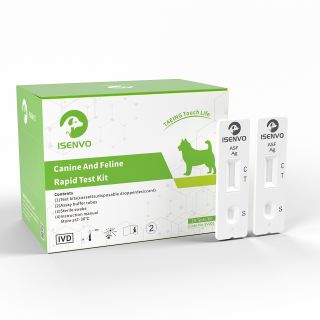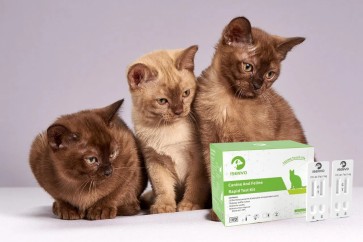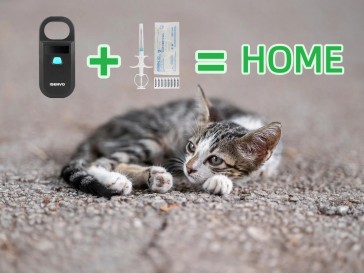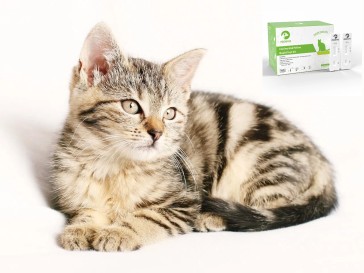As a responsible pig farmer or pet owner, understanding the risks of African Swine Fever (ASF) is crucial to safeguarding your herd. ASF is a highly contagious and deadly viral disease that affects pigs, with devastating effects on both the health of the animals and the economics of pig farming. The African Swine Fever Virus Antigen (ASFV Ag) Test Kit provides an essential tool for early detection and management, helping prevent the spread of ASF and ensuring the health of your pigs.
This article explores what ASF is, how it spreads, its symptoms, and the role of the ASFV Ag Test Kit in maintaining herd health.
What Is African Swine Fever (ASF)?
African Swine Fever (ASF) is a severe viral disease that affects domestic and wild pigs. Unlike other swine diseases, ASF is not transmissible to humans (not zoonotic), but it is highly fatal for pigs, often leading to 100% mortality in infected herds. The disease causes systemic inflammation, bleeding, and severe damage to the organs, particularly the lymph nodes and spleen.
ASF is caused by a virus that is highly resistant in the environment, making it challenging to control once introduced to a pig population. Therefore, quick detection and isolation are key to preventing outbreaks.
How Is ASF Transmitted?
ASF can spread through multiple routes:
Direct Contact: Infected pigs shed the virus in their blood, saliva, and feces. Direct contact with infected animals or their bodily fluids is a primary transmission method.
Contaminated Objects: Equipment, feed, clothing, and vehicles can harbor the virus and transfer it between pigs or farms.
Ticks: Certain species of ticks can act as vectors, transmitting the ASF virus from one pig to another.
Airborne Transmission: Although rare, ASF can also spread through the air, particularly in crowded environments like farms or slaughterhouses.
Symptoms of ASF Infection
Infected pigs can show a range of symptoms, from mild to severe:
Fever: High body temperature, often above 40°C (104°F)
Loss of Appetite: Infected pigs may refuse to eat or drink
Hemorrhages: Bleeding under the skin, around the ears, and in the internal organs
Abnormal Skin: Darkened or blotchy skin due to internal bleeding
Respiratory Symptoms: Coughing, difficulty breathing, and nasal discharge
Sudden Death: In severe cases, pigs can die suddenly, often within 7-10 days of showing symptoms
Why Is Early Detection Important?
ASF spreads quickly and can decimate an entire pig population within days, making early detection and intervention critical. The ASFV Ag Test Kit allows for rapid on-site testing, enabling farmers to identify infected animals before the disease spreads. This early detection is key to minimizing economic losses, controlling outbreaks, and protecting the health of the entire herd.
The ASFV Ag Test Kit: How It Works
The ASFV Ag Test Kit is designed to detect the presence of ASF virus antigens in the blood or serum of pigs. The test is highly accurate and provides quick results, which is crucial for timely decision-making in managing the disease.
Key Features:
Rapid Results: Results are available in as little as 15-30 minutes, allowing farmers to quickly assess their herd's health.
Easy to Use: The test is simple to administer and does not require specialized equipment, making it ideal for on-site testing.
High Sensitivity: Capable of detecting low levels of ASF virus antigens, ensuring that early-stage infections are identified.
Cost-Effective: Affordable for regular use, reducing the financial burden of extensive laboratory tests.
Steps for Using the ASFV Ag Test Kit:
Collect a Sample: Using a sterile needle, collect a blood or serum sample from the suspected pig.
Prepare the Test Kit: Add a small amount of the sample to the test device according to the manufacturer's instructions.
Wait for Results: Results will appear on the test strip in 15-30 minutes, indicating whether ASF antigens are present.
How to Prevent ASF Infection
Prevention is always better than cure. Here are several key steps to reduce the risk of ASF in your herd:
Biosecurity Measures:
Limit farm access to prevent contamination from external sources.
Disinfect equipment, vehicles, and clothing regularly.
Isolate new pigs or pigs showing symptoms before introducing them to the main herd.
Control Ticks: Use tick control measures on farms where ticks are prevalent.
Monitor and Test Regularly: Regularly use the ISENVO ASFV Ag Test Kit to test your herd for early detection of the virus.
Quarantine and Report: If ASF is suspected, immediately isolate the infected pigs and notify the relevant authorities to help control the outbreak.
Reduce Stress: Stress weakens the immune system of pigs, making them more susceptible to infection. Ensure your pigs are kept in comfortable, stress-free environments.
What to Do If ASF Is Detected
If the ASFV Ag Test Kit indicates that a pig is infected with ASF, it is crucial to take immediate action:
Isolate the Infected Animal: Immediately separate infected pigs from the rest of the herd to prevent further transmission.
Contact Veterinary Authorities: Inform your veterinarian and local authorities to ensure proper quarantine and control measures are followed.
Monitor Other Pigs: Test and monitor all pigs in close proximity to the infected animal for signs of the disease.
Destroy Infected Pigs: In most cases, ASF-infected pigs will need to be culled to prevent the virus from spreading.
Final Thoughts: Early Detection and Prevention Are Key
African Swine Fever is a devastating disease that requires quick action to prevent widespread outbreaks. The ASFV Ag Test Kit plays an essential role in detecting ASF in its early stages, allowing for timely isolation and management of infected pigs. Regular testing, along with strict biosecurity practices, can help minimize the impact of ASF on your herd and your farm's livelihood.
Pro Tip: Always consult your veterinarian for advice on testing, biosecurity measures, and disease management tailored to your specific farm environment.









